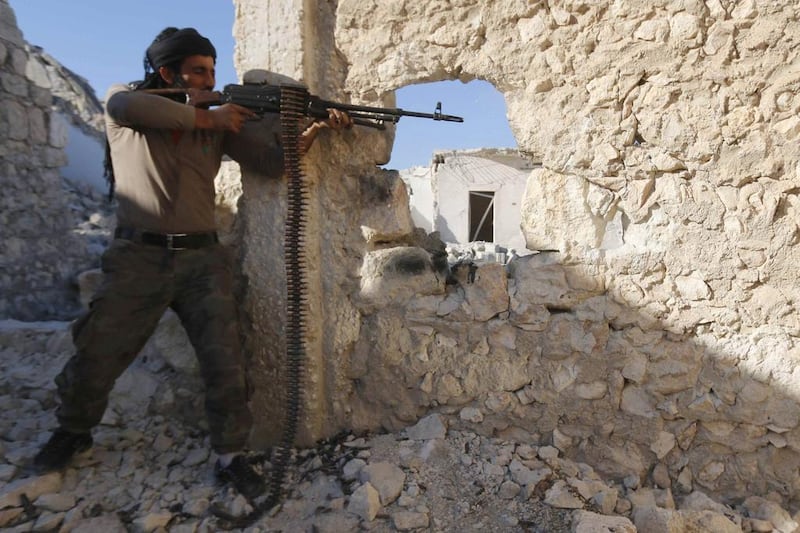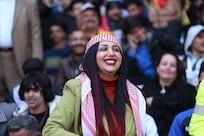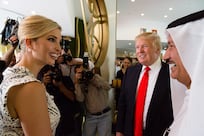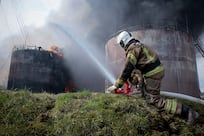DAMASCUS // Syrian president Bashar Al Assad said on Monday that the UN envoy’s proposal to implement a ceasefire in the embattled northern city of Aleppo was “worth studying”. The envoy, Staffan de Mistura, first raised the idea of small-scale, localised and negotiated truces in Syria at the United Nations in New York last month. The proposal would involve freezing the fighting in certain areas to allow for humanitarian aid and local steps as part of a push towards a wider peace in Syria’s 3 1/2-year civil war that has killed more than 200,000.
His plan drew an immediate backlash from Syrian media outlets considered mouthpieces for the government, which warned that the veteran diplomat was being “hasty” and overstepping his authority.
On Monday, Mr de Mistura met with Mr Al Assad in Damascus for talks that touched on the idea of a local ceasefire in Aleppo, Syria’s former commercial hub and the last major city where rebels still hold large areas as they battle government forces.
“President Assad ... considered that the initiative of de Mistura was worth studying and trying to work on to achieve its goals of returning security to the city of Aleppo,” said the statement, published by the state-run Sana news agency.
It was not immediately clear whether Mr Al Assad’s remarks reflected a change in the government’s stance, or an attempt to appear open to the idea without committing to it.
Mr de Mistura, who is a on a three-day trip to Syria aimed at reducing the violence, also travelled on Monday to the central city of Homs, where he visited mosques and churches that were once in rebel-held districts before a local ceasefire agreement earlier this year brought an end to the fighting. He also was expected to meet a delegation representing armed groups from Waar, the last rebel-held part of the city.
Meanwhile, Iraqi government troops have ordered Shiite militias to stay back from the front lines to reduce hostility from villagers as they advance into Sunni areas held by ISIL fighters.
The Shiite militias played an important role halting the dramatic advance by ISIL fighters through northern Iraq in June, when Iraq’s army crumbled. Since then they have received the endorsement of the government.
But their presence frightens and angers many Sunnis, who believe they have carried out killings and kidnappings with impunity, which the militias deny.
Winning the support of the local population is seen as crucial to defeating ISIL, but a difficult task as long as the feared Shiite militias are playing a prominent role on the battlefield.
Government forces, now supported by US-led airstrikes, are advancing this week into the city of Baiji, held by ISIL, which has also besieged Iraq’s biggest oil refinery nearby.
The army general in command in the province said he had ordered the militias away from the front line after they torched two houses of Sunni villagers.
“We decided to remove the militias from front lines and assign them duties like holding ground behind attacking security forces,” Lieutenant General Abdul Wahab Al Saidi said by telephone.
“They lack discipline, easily lose control and lack proper military training,” added the general, himself a Shiite.
An officer who was at the scene said Shiite army officers confronted the Shiite militiamen after the houses were torched, and shots were fired by both sides.
Major Saadi Hamdan said the order to move the militia fighters away from the front had already paid off in improved cooperation with the local villagers.
“Many people have started to call us and give us locations where terrorists are hiding and the places where they hide the car bombs,” said Maj Hamdan. “The wrong practices of militias, such as burning houses, could send the wrong message to the residents that they might become a target for the militia after liberating the city.”
Abu Marwa, a farmer in the area, said many locals had embraced ISIL when the fighters initially arrived, because they promised to help defend the area from the militias and the Shi’ite-led Baghdad government.
“We were very pleased because we were living under the mercy of sectarian government forces. But those joyful feelings didn’t last for too long,” he said by telephone.
“Many people were executed by ISIL because they were members of the police or army. More blood of the innocents was flowing now than under government troops.”
A victory in Baiji would be a psychological boost for the army after its collapse in the north in June.
Unusual alliances appear to be emerging. Sunni tribal chief Hamid Al Qaisi leads about 100 men who fight alongside government forces. Mr Al Qaisi said he also teams up with Shiite militias who give his fighters weapons, but agrees they should not spearhead operations.
“Almost all the arms we are using now against [ISIL] were given to us by the militias,” he said.
On Monday, a Pentagon official said the US military cannot confirm reports that the ISIL leader may have been struck in an airstrike, but suggested on Monday that lower-level figures may have been hit.
Speculation has swirled over the fate of Abu Bakr Al Baghdadi after local claims that he was killed or wounded in a strike by the US-led air armada targeting his group.
“Obviously there’s a lot of conflicting reports out there on the fate of Al Baghdadi. But the bottom line from our perspective is we simply cannot confirm his current status,” Pentagon spokesman Colonel Steven Warren said.
The Pentagon has said strikes on Friday hit a gathering of IS leaders in the northern Iraq city of Mosul, prompting rumours of Mr Al Baghdadi’s demise.
* Associated Press, Reuters, Agence France-Presse





